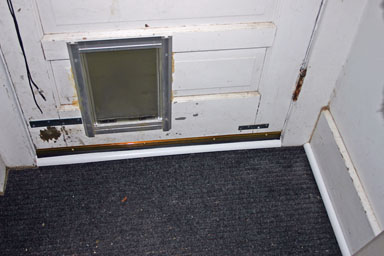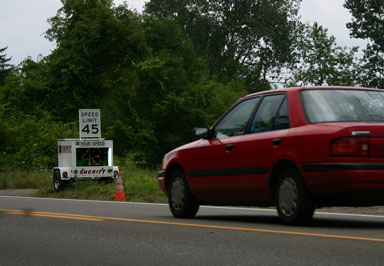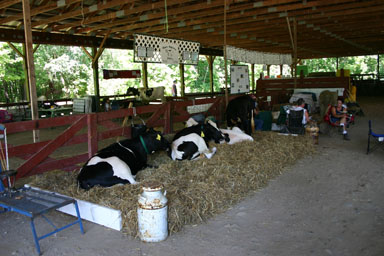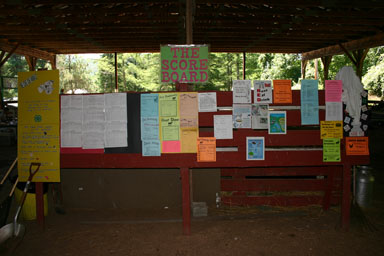July 2, 2005
Varna expands
New York State makes it very difficult for cities and villages to expand, requiring complex annexation processes, as the Ithaca Journal discussed yesterday in relation to the City and Town of Ithaca.
On the other hand, hamlets, which aren't incorporated, are largely the area between a pair of road signs. The signs for Varna have marked the core of the hamlet for as long as I can remember, but on Monday, the Department of Transportation put up new signs, one of which expands Varna a mile east of its earlier sign.
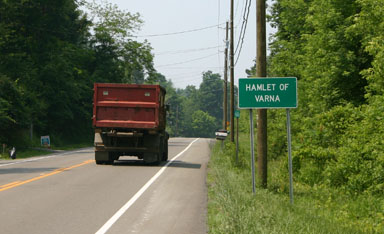
New Varna sign, a mile east of the old one.
On the other side, the hamlet seems to have inched closer to Cornell University as well. I'm not sure who's decreed this expansion, but it seems reasonable to me - though it just misses including my house.
July 4, 2005
Graduation, trails
This week's Dryden Courier leads with the Dryden High School graduation, as well as congratulations given to the Dryden school board and superintendent. Inside the paper, there are articles on the plans for a Freeville-to-Dryden trail and one on the walk Rebecca Elgie and Bernie Fetterly took, including a stop at Dryden's Time Square park, to highlight health care issues facing the country.
On the opinion page, the Courier's editorial chides the state Assembly and Senate for a lot of missed opportunities.
There's also an announcement from Duane (Tyke) Randall that he'll be running for the county legislative seat currently held by George Totman, which will force a Republican primary. The district includes Groton, the eastern edge of Lansing, and the northeastern corner of Dryden. Democrat Athena Kalandros is also in the race for that seat. The Courier seems to have done a light edit of a press release, and it keeps slipping between "Randall" and "I".
Freeville resident Brianna Farver and Dryden resident Charlotte Becker are listed for graduating from the University of Vermont and St.Lawrence University, respectively.
In sports, there's an article on TC3 softball, which includes recent Dryden High graduates Tiffany Volkert and Gabrielle Blackman, as well as a piece on hours for the Dryden High School fitness room, which will be open to student athletes Monday through Friday from 5:00pm to 6:30pm, as well as Monday, Wednesday, and Friday from 9:00am to 11:00am. It will be open to the public from 6:30am to 8:30am Monday through Saturday mornings as well as from 6:30pm to 8:30pm.
Beachy receives Award for Excellence
It's been a quiet holiday weekend in the Ithaca Journal, with only a few Dryden-related stories, all of them Friday. Lawrence Beach, who I served one day at the Varna pancake breakfasts and who introduced me to the Dryden Town Historical Society, received a Tompkins County Trust Company Award of Excellence for his work at the Historical Society, Neptune Hose Company, and the 1997 Dryden Bicentennial and recent Victorian Winter Festival. His award money went to the Dryden Presbyterian Church.
There's discussion of possible service consolidation between the Town and City of Ithaca, which might affect Dryden, as Dryden already shares wastewater services with those two municipalities. (There's an article with more details on municipal consolidation possibilities in the Ithaca Times this week as well.)
Judy Pierpont of Dryden writes about woodpeckers in the disputed Redbud Woods.
July 5, 2005
Legislature races update
This morning's Ithaca Journal introduces Duane Randall as a Republican candidate for incumbent Republican George Totman's seat on the county legislature and provides a complete list of known candidates in all of the county districts. Since the Journal's articles now only last a week, here's the list for races including Dryden:
9th District (Groton, eastern Lansing, northeastern Dryden) - Republican incumbent George Totman now faces Republican primary challenger Duane Randall as well as Democrat Athena Kalandros.
13th District (western Dryden) - Democratic incumbent Martha Robertson faces Republican challenger W. David Restey.
14th District (eastern Dryden) - Democratic incumbent Mike Lane faces Republican challenger Mike Hattery.
In Caroline, a Six Mile Creek stream stabilization project should keep water that pours in from Dryden's hills from washing Caroline sediment out through Dryden and Ithaca into Cayuga Lake.
On the opinion page, Henry Kramer of Dryden hurls contempt at the push for a Living Wage, finding such notions too far from full-blooded capitalism for his taste.
July 6, 2005
Dryden Methodist pastor retires
Cathy Wakeman writes about Dryden United Methodist Church pastor David Nicholls' retirement in today's Ithaca Journal. Nicholls retired on Sunday after ten years at the church, and he and his wife Maxine plan to stay in the area.
There's also an article on the planning for the Dryden-Freeville trail, which generally sounds to be moving forward except for this bit:
While the project is moving forward, there are still obstacles ahead. Engineers are still wrestling with how to cross the well-trafficked George Road and landowners like Warren VanPelt still have unanswered questions.
"They've got weird trails all going through the fields, and I don't like that. I've got special needs, and they haven't had a meeting with me yet," VanPelt, who farms along the proposed trail, said.
If everything gets sorted out, planning will finish this year and construction will start next year. (I reported earlier on the trail open house held last month.)
On the opinion page, the editorial takes up (and supports) the prospects for services consolidation between the City and Town of Ithaca. As I noted earlier, the Town of Dryden participates in some water and sewer services already shared by those municipalities.
July 7, 2005
Groton man killed in Freeville accident
Thomas Guihan, 81, of Groton, died yesterday afternoon in a one-car accident on Brooklyn Road in the Village of Freeville. Dryden police, the Freeville and Dryden fire departments, and Bangs Ambulance all responded to the accident.
July flowers
Sure, flower photos are a classic cliché. Still, they're a nicer part of the world than many.
These are lilies in my yard, mostly, but lots of lovely flowers. Tracey, of course, gets all the credit for the flowers growing so well here.
July 8, 2005
Letters on schools, county negotiations
This morning's Ithaca Journal is quiet on Dryden news, but has two letters to the editor from Dryden residents. Edgar Seymour of Freeville writes to argue that in school budgets, "When all things are considered the majority of cost is under local control."
Iretta Ellis of Freeville, a county employee, writes about the impasse between the county and its unions, and worries that:
There doesn't seem to be any clear leadership in the county, no accountability for their actions. I believe this may come down to the fact that we tend to only pay attention to our legislature and county administrator when it is time for the budget to be approved or election time. Once the candidates have been elected and the budget is passed, we tend to forget about them and let them do as they want. Please, become involved and stay informed.
In the Ithaca School District, the board named Roy Dexheimer president and approved AVID, a program aimed at helping lower-income students, encouraging them to enroll in advanced courses and go on to college.
July meetings
The public notices page for July lists meetings for this month. (Sorry, the first two have happened already.)
- The Zoning Board of Appeals met at 7:30pm on Tuesday, July 5th.
- The Recreation Commission met on Wednesday, July 6th at 6:00pm, in the Dryden School District Office Conference Room.
- The Conservation Board is meeting Tuesday, July 12th, at 7:30pm.
- The Town Board is meeting at 7:00pm on Thursday, July 14th. They'll be starting with a public hearing about the Comprehensive Plan.
- The Youth Commission will meet July 19th at 6:00pm at the Dryden School District Office Conference Room.
- The Planning Board is meeting at 7:00 pm on Thursday, July 21st.
Unless otherwise noted, all meetings listed here are at the Dryden Town Hall (map).
July 9, 2005
IDA, Ithaca transportation study
There are a few articles in today's Journal which mention Dryden, but all of it is about issues in Ithaca. An article on possible tax breaks for the Gateway Center project in downtown Ithaca quotes County Legislator Mike Lane, Chair of the Industrial Development Agency, who asked a consultant for a more specific set of numbers in evaluating the project.
On the opinion page, Town of Ithaca Supervisor Cathy Valentino writes about the traffic study the town is doing with Cornell, and notes that surrounding muncipalities, including the Town of Dryden, will be consulted.
July 10, 2005
Creating a place for kids
This week's Dryden Courier leads with articles on improving life for Dryden children. There's an article on Opportunity, Understanding, Respect, and Success (OURS), a group providing activities in Conger's Mobile Home Park started by Jessica Houle, a Cornell student who grew up there. Houle got a grant through Cornell Cooperative Extension, and is working toward buying a meeting place, and 4-H can provide insurance. A grant from Tompkins County Trust Company funded rock climbing at Cornell as well.
There's also an article that talks with Dryden Superintendent Mark Crawford's first year on the job. Crawford describes his happiness about the way the year has gone, from the budget to the unions to the fine arts program and graduation.
Inside, the paper looks at the volunteer project that Better Housing of Tompkins County is bringing to work on houses throughout the area, with crews from Group Workcamps. Oddly, the article doesn't mention that Group Workcamps is a Christian mission program. The week's work should provide $80,000 worth of labor, with crews coming from all over, even one from Canada.
There's also an article on the Ithaca Community Treatment Court, more commonly called Drug Court, and a piece on Assemblywoman Barbara Lifton's being appointed to lead the New York State Legislative Task Force on Women's Issues, as well as an editorial offering half-hearted thanks to the legislature for finally passing voting machine legislation.
In sports, there's an article on the Stuttle family of Dryden, and their decades of participation in Dryden athletics.
Public hearing on Comprehensive Plan Thursday
This Thursday's Town Board meeting will start with a 7:00pm public hearing about the Comprehensive Plan that's been coming through the Planning Board for the past few years. The Comprehensive Plan lays out the proposed future for the town for the next few decades, dealing with issues from densities for various parts of the town to approaches for preserving agriculture and open space to balancing commercial and residential development along Route 13.
The Comprehensive Plan went to the county for review, which came back with some recommendations for changes (173KB PDF, 504KB selectable). There's also a detailed set of suggestions in reponse to that letter (346KB PDF, 811KB selectable) from Environmental Planner Debbie Gross. She notes that the Town Board can override the county's formal objections with a majority plus one vote (a 4-1 vote, effectively), and explains the positions.
If you haven't read the Comprehensive Plan, I strongly encourage it. Pages 51 and onward are the specific recommendations, and Maps 5-1 to 5-3 show the proposed shape of the town in the future. I find 5-3 especially useful, as the proposed additional water and sewer service shows where much of the new denser development might go that doesn't exist today.
July 11, 2005
Bicycling to Canada for human rights
This morning's Ithaca Journal reports that a group of bicyclists will be riding for nearly a month, starting from Hanshaw Road in Dryden and going around Lake Ontario to Ottawa starting tomorrow. The group, Weavers of the Wind, will be presenting a petition about genocidal violence in Darfur, Sudan to Canadian government representatives. There's also a letter about the ride, which will start at 9:00am tomorrow.
I wrote yesterday about the Christian mission Group Workcamps coming to help repair Tompkins County houses. Today, the Journal visits their camp at Boynton Middle School in Ithaca, looking at what brings 405 people here, each willing to pay $500 each for the privilege of doing construction work.
A supposedly simple project
Repairing all of my windows is going to be a big project, one that will take some time, though I hope I'll get better at it over time. I'm also trying to do some smaller projects, though I'm finding again and again that projects which seem small often develop complications or extensions.
My parents decided to stay in Corning when they retired, and one of the things they did to update their house was replace a lot of failing appliances and replace the counters in their kitchen. (They'd done a major renovation in 1984, and there was no reason to embark on a larger project.) When I got there to see it, I thought they must have found new vinyl flooring that exactly matched their previous flooring, but no, it was the original flooring.
My father had talked with the contractor about replacing it, and he'd recommended trying to clean it first. My father went to Home Depot and got some Armstrong cleaning products - one called "Once'n Done" and another called "Shinekeeper", which was a polish.
We've known for a long time that our kitchen floor had to go, but tolerated it while waiting to get to a larger-scale kitchen renovation. This cleaning, however, seemed like a great thing to do in the meantime, since it'll likely be years before we get to do the kitchen.
On my way home from seeing my parents, I stopped at Home Depot and tracked down the same stuff. Sitting next to it on the shelf was a different Armstrong product, called "New Beginning." Given that my kitchen floor had resisted previous attempts to clean it, and since it looked like this stuff took off the top layer of polish, perhaps with its ground-in dirt, I got a bottle of that too.
For the next couple of weeks, the bottles sat in the kitchen, since emptying the kitchen to clean the floor was a minor project of its own. Finally, on the 4th of July, I got around to emptying the room and exposing the floor. Some of the mess was from carpets we'd put in as extended doormats, but some of it was just the floor itself, dirt that had been there since before we moved in, stubbornly refusing to move even when mopped.

Ground-in dirt on a vinyl floor.
I'd bought a scrubbing brush, and poured the "New Beginning" stuff on a corner of the floor and started scrubbing. Dirt came off rapidly, and the surface after rinsing looked good, if not, well, polished.
After scrubbing the floor by hand with this, mopping up all the dirt it freed, and then applying the Shinekeeper polish (maybe four hours total), I had a bright and shiny floor, which Sprocket quickly took advantage of:

Sprocket enjoying the newly clean floor.
The floor doesn't look quite as perfect as my parents' floor, but I think it's a few decades older, and I'm amazed by the change. Of course, in moving things around to clean, I found two leaks that had probably been there a while, and have both a plumber and appliance repair on their way.
The other big problem was the entryway by the back door. I'd originally planned to clean it like I did the kitchen, but it turned out that the vinyl there was little pieces with a carpet tacked down in the middle. After ripping that out, I found that part of the wooden subfloor near the door was rotten, though not all the way through, and so a simple cleaning turned into a floor reconstruction project.
So, I pulled out some wood hardener and wood filler, and went to work, hacking out the rotten wood and hardening the remaining wood before filling it. (Bondo actually sells a kit with the stuff you need, but I already had the Minwax stuff around.) Then I got to apply a lot of filler, add a wooden piece to the threshold, paint some new molding, install some industrial carpet with a rubber base, and finally put it all together.
Of course I spilled wood hardener on the door threshold, so I got to repaint all of it, with oil paint that required watching as it dried to keep the dogs from walking through it. And as long as I was repainting it, I took the door off the hinges and planed its edges so it will close better. In the end though, it's all vastly nicer than it was. A lot more work than expected, but that's the way it always seems to go.
Oh, and of course now I'll need to clean and/or repaint the kitchen and entryway so the rest looks as good as the floors!
If you'd like to see more, I've posted a gallery of photos.
July 12, 2005
Dryden resident attended Christian politics conference
This is a bit old, but it's unusual for me to see a Dryden resident quoted in the Christian Science Monitor, so it seems worth reporting.
Back in March, the Christian Science Monitor ran a report on a 'national conference aimed at "reclaiming America for Christ"', complete with the Ten Commandments monument that had been in the Alabama judicial building until it was removed as an unconstitutional display. Dryden comes into the story with this paragraph:
Gabriel Carpenter, from Dryden, N.Y., works at a local crisis pregnancy center and is a coordinator for the now-required sexual abstinence program in New York public schools. He and his wife, Penelope, say they hope to "learn more about how to share America's Christian heritage with others."
It looks like the conference was held through the Center for Reclaiming America, part of Coral Ridge Ministries.
July 13, 2005
McLean author, fundraising
This morning's Ithaca Journal doesn't say much specifically about Dryden, but there are bits and pieces. The McLean Fire Department, which covers the northeast corner of Dryden, is raising funds for EMS equipment, and there's an article on Diane Martineau of McLean, who is publishing a children's book, "The Wall on 7th Street."
Dryden resident Burr Ripley is quoted in an article on the 50th anniversary of the Cayuga Heights Fire Department, and Dryden resident Bill Apgar has a guest column about the Cops, Kids, and Toys program.
Looking beyond Dryden, the idea of a county income tax appears to be dead, and the Journal's editorial congratulates Governor Pataki for signing bills today permitting interstate wine shipments and making it harder for state employees to avoid investigation by resigning.
Southworth Library Tuesday nights
This week's issue of The Shopper includes a list of "Tuesday nights on the lawn" presented by the Southworth Library. They include:
- July 19th - Guinea Pig Party!
- July 26th - Tadpole Surprise!
- August 2nd - Lori Stefferson, Storyteller
- August 9th - Teddy Bear Picnic (Bring Your Bear!)
- August 16th - Trooper Ruland and his canine, Baker!
The events start at 6:30pm, on the lawn behind the library. As they put it, the events "are free and open to all ages, so bring the family, bring a blanket and enjoy stories, activities and snacks."
July 14, 2005
Water issues coming up
The Ithaca Journal's editorial this morning looks at the possibility of the City of Ithaca joining the Bolton Point water system, which is jointly owned by other municipalities, including the Town of Dryden.
Otherwise, it looks like Dryden's been peaceful. It's been a quiet week, though perhaps tonight's public hearing on the town's draft Comprehensive Plan will make the news. (Not that I expect fireworks; it's just been a very quiet July for Dryden news.)
Gwen Wilkinson submits petitions for DA race
I went down to the Board of Elections today, where District Attorney candidate Gwen Wilkinson gave a brief press conference as she turned in the signatures to put her on the ballot in November.
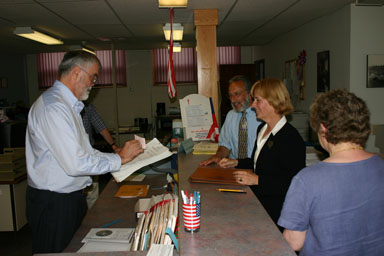
Election Commissioner Steve DeWitt examines District Attorney candidate Gwen Wilkinson's petitions, while former Assemblyman Marty Luster and Democratic County Chair Irene Stein look on.
I recorded Wilkinson's comments, though sadly my voice recorder ran out of batteries near the end.
Good morning everybody! Thanks for coming.
We're here today for the filing of the petitions, and I am delighted to announce at this time that we have 2,483 signatures [applause] for the Democratic line, and we have substantially more signatures than is required for the Working Families Party line. [applause] My name will appear on both those ballot lines in the general election.
I'd like to take this opportunity to thank everyone - the volunteers who carried the petitions, the people who signed the petitions, for their support for my campaign.
It is clear from this overwhelmingly large number of signatures that there is a groundswell of support for this campaign. I myself did a lot of walking, passing the petitions, and the feedback from the voters is clear.
They are in favor of improving the prosecution against violent crime, and they are in favor of fighting addiction-related crime through the use of drug courts.
I will be looking forward to speaking with all of the voters more as the election cycle progresses, and I'm pleased to be submitting these petitions here today. Thank you very much.
[Inaudible question from Geoff Dunn of WHCU - more specific about violent crime.]
Specifically, with respect to violent crime, people are discouraged, upset, even outraged at the failure to prosecute crimes of domestic violence and child abuse by the incumbent. On the subject of addiction-related crime, there is overwhelming support in the county for the use of drug court as part of the sentence for addicted offenders. There is overwhelming support for the need to wipe out addiction and the crime it generates. People are clearly tired of revolving doors to the prisons, without getting treatment.
[Voice recorder battery dies.]
It's shaping up to a great race for D.A., as Wilkinson challenges 16-year incumbent Republican George Dentes.
July 15, 2005
Anderson Young new Dryden School Board President
This morning's Journal reports that the new school board president in Dryden is Anderson Young, with Russ Kowalski as vice-president.
In Community News, the Journal notes that Erin Radford, who grew up in Freeville, got a master's degree in international studies from the University of London and is "a program assistant for the Middle East/Africa Division of the International Foundation for Election Systems."
The Journal has an overview article on politics in the county after yesterday's petition filings, but the online version, lacking listings, is strangely frustrating. It says, for instance, that there's going to be a primary race in Groton, but unless you already knew that it was a Republican primary, you might well wonder what kind of primary.
The print version lists candidates, but it too has a problem: the Journal doesn't mention that the caucuses used by many town Democratic parties (including Dryden's) can run through September 19th, so a lot of towns look like there won't be contested races. There likely will be races - the candidates just haven't formally been chosen by the party yet, and the Journal seems not to have noticed that petitions are not the only form of nomination.
In Dryden, the Journal shows county legislative races between Martha Robertson and Dave Restey on the west side and Mike Lane and Mike Hattery on the east side. District 9, which includes northeastern Dryden as well as Groton and a slice of Lansing, has incumbent legislator George Totman in a Republican primary with Duane Randall, and Athena Kalandros running as a Democrat.
At the town level, Republicans are running incumbents Jack Bush for Highway Superintendent, Steve Trumbull for Supervisor, and Steve Stelick for Town Board, along with newcomer Dan Tier for Town Board. Democrats will be holding their caucus next month.
Update: I missed a photo inside the paper of Tom Finn and Fred Butler laying a wreath at William 'Daddy' George's grave during the Founder's Day reunion at George Junior Republic (now the William George Agency for Children's Services).
July 16, 2005
Dryden people, Ithaca projects
This morning's Ithaca Journal doesn't look at what's happening in Dryden, but it has three pieces in which Dryden residents are involved in Ithaca.
In an article about the approval of tax breaks for the Gateway II project in downtown Ithaca, Dryden resident and Ithaca School Board member David Lee opposed the tax breaks. County Legislator Mike Lane, chairman of the Tompkins County Industrial Development Agency, voted with the majority to approve the tax breaks after long and contentious discussion, as did Legislator George Totman.
In Darts & Laurels, Ellis Hollow resident Jeanette Knapp, in her capacity as president of the Board of Directors of the City Federation of Women's Organizations, sends a laurel to a wide variety of people and organizations for the July 4th flares around the lake, which helped support the Federation and the Women's Community Building.
In letters, Marcus Collins of Etna uses the controversy over Redbud Woods to address the larger question of the depth of Cornell's interest in sustainable use of resources:
we have many older students and graduate students who live many miles away where bus service is poor. But we also have students who are driving from Collegetown. Collegetown. That is ridiculous, wasteful, and lazy; by catering to such parking "needs" you are buying into an unsustainable lifestyle.
Moreover, what is sustainable about building on our green space? What is sustainable about forcing our athletes to commute a couple miles to their practices after you build over their fields? These new dorms (which lack many sustainable ideas suggested for them) are supposed to be about education. Why not teach these students about the wastefulness of driving two blocks up the hill. Besides, you can tell them, "It's a nice walk."
While I don't see anyone from Dryden quoted in the story about last night's Harry Potter midnight release parties, I suspect Dryden residents were among those enjoying the fun. I meant to stop by myself, but fell asleep on the couch instead. Oh well.
A. K. Fletcher returns for a visit
A. K. Fletcher, 97, the retired publisher of the Dryden Rural News (and a proud Democrat), came back to Dryden for a visit yesterday, gathering with friends at the Dryden Hotel for lunch.
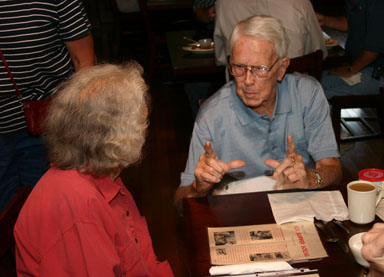
A. K. Fletcher talking with Elsie Gutchess.
The Rural News, though it stopped publishing in the 1970s, has been an inspiration for this blog, with its local focus and interest in the community. I hadn't met Fletcher until yesterday, but I'm very happy I got the opportunity. There were a lot of people there to enjoy lunch and reflect on a past that grows more interesting with every telling.
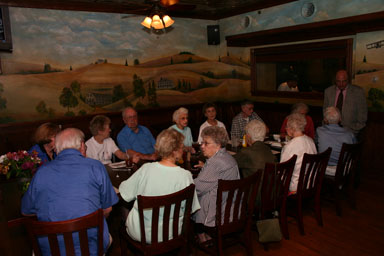
One of the tables at the A. K. Fletcher lunch.
Fletcher's returning to Florida soon, but I hope I get to talk more with him soon. The Dryden Town Historical Society has some interviews with him, and it seems like everyone there has stories about him as well.
July 17, 2005
Masons move into West Dryden
The lead story in this week's Dryden Courier is the Hobasco Lodge No. 7216 Masons moving into the old Methodist Church and former West Dryden Community Center on West Dryden Road. The Masons, who meet there once a month, are working on repairing and upgrading the church, and need to winterize the downstairs for year-round use. (I've written about the church earlier, and you can also see the church and surrounding community in an aerial photo.)
There's a report on playground work at the three Dryden elementary schools, as well as news that Anderson Young is the new president of the Dryden school board with Russ Kowlaski as vice-president.
Dryden resident and sheriff's deputy Kevin Cowan was honored as Frank Hammer Officer of the Month by the Ithaca Kiwanis, for his work on D.A.R.E. and a variety of safety programs as well as road patrol.
In the Groton section, the Courier has a pair of articles on the upcoming county legislature race in District 9, which includes Groton, eastern Lansing, and the northeast corner of Dryden. There's a profile of Athena Kalandros, running as a Democrat, discussing why she chose to live in Groton, concerns she's heard from voters, and her willingness to "do what it takes to help Groton continue to be a viable and vibrant community." There's also a profile of Duane Randall, a Republican running for the seat. Randall talks about how the "community has always been there for us," and how he wants to give back to the community. Randall will be running against incumbent George Totman in the Republican primary, and the winner of that will face Kalandros in the November election.
There are some pictures of kids in the Dryden High School swimming pool on the front page and inside the paper, including Joel and David Whitmore as well as instructor David Hamilton.
Comprehensive Plan debated at public hearing
Thursday night's public hearing on the proposed Town Comprehensive Plan demonstrated residents' concerns and hopes for these guidelines for future development in the Town of Dryden.
The first speaker, after Supervisor Steve Trumbull had opened the hearing, noting that this process had been in the works for at least seven years, was Ken Miller, a farmer who has spoken at several Planning Board meetings:
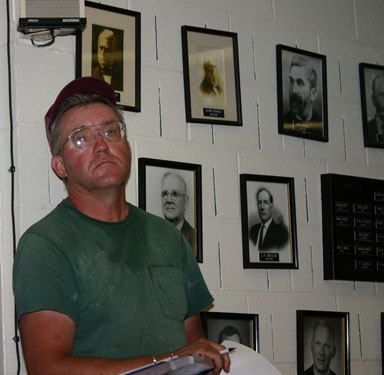
Ken Miller expresses his concerns about the Comprehensive Plan to the board.
I was part of the ag committee and my biggests concerns are that this plan may take away a lot of property rights of people that they don't even realize. They don't even know this plan is taking place.
If you've read it, you look at the first 30 pages, it gives some justification for making the plan. If you really read it, most of those 30 pages give you good reasons for not changing the plan.
Dryden has moved along very well. We're only growing at a rate of about 2%, according to this plan. I don't think we need to change things in this town. Things are going just fine as far as I'm concerned and that's why I bring some of these concerns.
One of the things about the ag committee, which I was on, we got started, we had several meetings, and all of a sudden one of the Planning Board members showed up, I feel they dominated the conversation, and all of a sudden it was like, "okay, everything's great." I don't believe the committee focused. I thought they needed more time to work out some things and see what kind of positive things this town could do in order to help the farmers in this town out.
I would like to know whether or not the comprehensive plan, if the Town Board here is going to send the comprehensive plan to Ag & Markets or the Tompkins County Farmland Protection Board for any of their input that might concern the farmers of the area, and there would be things in there that could be very negative to the farmers of the area, that we might want to change before we go ahead and pass this thing.
I was given the impression that it would pass tonight, and that it would immediately start making changes. I don't know why - first of all, I don't believe we need changes. Second of all, I don't know - I'm not quite sure - whether this plan, once it's passed, all of a sudden becomes a law, or just a plan, and then we have to make laws. If we have to make laws, it would seem like it's going to cost us a lot of money to enforce them and what not, and make these changes.
The plan that we have in effect right now does us very well. Also, like I said in the beginning, I'm concerned about our freedoms. I've been in the service, and we fought for the freedoms in this county, and more and more, I'm not sure who owns more of my property: the bank or the government. I keep paying taxes and paying taxes and paying taxes, and I don't believe that we have much freedom anymore. I don't want to see any more of it eroded by someone in a plan saying "Okay, now you can't put your house where you want to. You can only sell so many acres. Etcetera, etcetera, etcetera."
That's my concerns, and I would ask the Town Board not to pass this plan at this time.
Supervisor Trumbull reassured Miller that Thursday's hearing was just for collecting public comment, not for passing the plan, but did say they hadn't heard back from the county except for the county planning department's comments. Next, Planning Board member Joe Laquatra spoke:
I'm Joe Laquatra, a member of the Planning Board, and I want to thank Mr. Miller for attending many of our meetings and helping us through the process.
I would like to correct one misconception you have. This doesn't - this is not a law. It's a guideline for the town. What it does is provide a road map for zoning ordinances, which would be modified or updated. We were also recommending to the town that we have the authority to allow for cluster development, which we don't [have now].
What this plan does, in my view, mostly is protects us from sprawl that a number of counties across the state are experiencing. Once it starts, it's hard to stop.
What we found from the survey was that the majority of town residents want to maintain the rural character of the town, and that's what we tried to do. You helped us and alerted us to the concerns of farmers, and they're very legitimate concerns. But if we leave things the way they are, without protecting this town from what's happening around the state, we could end up like those other counties, those other towns.
And once it's done, then we have to live with it.
County Legislator Martha Robertson reported that she had attended an Agriculture and Farmland Protection committee meeting last year which discussed the plan with George Frantz, the planning consultant, but didn't know what had happened more recently, as she's no longer on that board.
Next to speak was Zorika Henderson, who asked:
How many parking lots will be necessary for the really massive trail system?
Environmental Planner Debbie Gross replied that she couldn't provide an estimate for all of the trails, which were just ideas, not formally proposed trails, but that the currently proposed Freeville-Dryden trail involves expanding a lot in Freeville, a new lot on Spring House Road, and a possible lot on municipal land on Elm Street in Dryden. She concluded by saying that "we certainly don't intend to pave any more space than is necessary to provide access to the trails."
After Martha Robertson mentioned the letter from the county planning department, Councilman Marty Christofferson read a distilled version of the letter into the record. After his distillation, Christofferson noted:
So those are really the four issues, which, you know, out of a big plan for a big town, that's really not a lot.... It's some good points to think about and talk about, but that's pretty good.
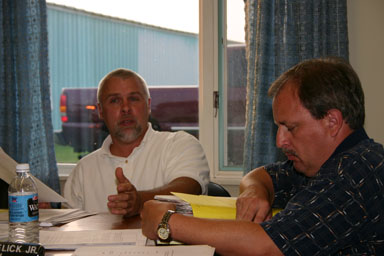
Marty Christofferson reads the county's concerns into the minutes.
Tom Hatfield, a Planning Board member, was next to speak:
It might bear pointing out that in addressing the one issue about the Route 13 overlay - I've lived here most of my life and one of my earliest memories is the three routes they were going to use to bypass the Route 13 corridor, when I was five years old or six years old, so the subject's been around a long time.
It's unfortunate that those that were responsible for making those plans then didn't have the wherewithal, the means, or the ability to carry them through.
One of the issues that came out loud and clear is that, as we addressed the community in this process, was traffic in the neighborhoods. Everybody would like to see especially the truck traffic reduced, the traffic taken out of it.
I happened to come upon an accident today on Route 13. While the state has managed to limit and control some of the access points, and some of the accients that used to be almost, sort of like a pandemic on 13 has come down some now, it's still a highly traveled route.
It means a lot of issues are going to have to be looked at, somehow to incorporate that corridor, and if the state and the county are about to come back to us, certainly to take a month, and take a look at what they're going to propose, would be a wise step to take. But it's an issue we have to keep an eye on on an ongoing basis.
Ken Miller spoke again briefly:
I need to get back to work. I thank Joe for his comments. I understand what he's talking about with this sprawl, but a 2% increase in population doesn't look like it's going to happen.
And I'd ask the board to re-read those first thirty pages, and look at it in a different light, and I think if it's read correctly, it'll show you that there are many reasons, right in that report, why you don't need that, and I thank you for your time.
Joe Lalley, also a member of the Planning Board, spoke next:
It's been a long effort, but through this effort - to me the meat of this plan is really on page 33, where you talk about the goals and objectives. I firmly believe the preservation of the agricultural nature of this community is important. I understand how you might feel that way, but certainly the right to farm and preservation of the agricultural character of this town has been very important.
One of the difficult things in going through a plan like this is you have the interests of the county, that want to focus on an area, like the Route 366 area, from Route 13 into the Town of Ithaca. At the same time you have a small community, the hamlet of Varna, that wants to maintain its identity and wants the exact opposite to happen. You have to try to balance those things.
Again, these are goals and objectives. The work that the Planning Board and the Town Board have done around this over the years doesn't stop if this plan is adopted in the next few weeks, but rather just begins, because it's then that we're going to have to start working on recommendations for things like perhaps changes to zoning ordinances that will allow us to really take some concrete steps toward preserving open space in this county.
The Town of Dryden has been very fortunate - there's been lots of development in the Town of Ithaca, there's been lots of development in the Town of Lansing. I've been here since 1974, I've seen the changes, and it's going to come here sooner or later. This is our opportunity to guide how that's going to happen. Because it will happen, and I think this is going to be really important for us to preserve the rural quality of Dryden, the thing that makes the Town of Dryden a really nice place to live.
Jim Myers of Caswell Road then brought up his concerns about traffic in the West Dryden area, connecting his concerns about local traffic and speeding with the sprawl and traffic issues included in the plan. Joyce and Ross Gerbasi agreed with the traffic problem, and there was also some discussion of asking the county to ask the state to do a traffic survey of the area, with lowered speed limits one possible key option.
During the traffic conversation, Legislator Robertson noted that a lot of those drivers were commuters from outside of the county commuting in to work. She wanted to be sure that the plan didn't restrict housing construction and drive prices further up, increasing the number of commuters. Planning Board member David Weinstein said that while the plan did limit some housing options, it also included room for five times as many housing units as the most optimistic projections suggested they'd need.
The hearing was closed about half an hour into the meeting, but there will no doubt be further discussion of the plan at future meetings.
July 18, 2005
County races, state legislative reform
I was annoyed with the Journal last week for publishing a list of candidates without noticing that there are caucuses yet to come, and they seem to have realized that in time for an editorial overview of races that wishes for more competition. Independent petitioning is underway now, and continues through August 23rd, and caucuses may be held as late as September 19th.
Also on the opinion page, Jay Gallagher pushes Governor Pataki to call for a special legislative session to tackle government reform, including things like independent legislative redistricting (#1 on my list, long-term), and tighter limits on fund-raising and gifts from lobbyists.
While looking for more on this, I found a piece by Jeremy Creelan of NYU's Brennan Center for Justice, the source of last year's report that may have embarrassed the legislature into the reform it undertook, takes a look at reforms the legislature passed last year and what remains to be fixed. There's also an article on the practical impact of the remaining barriers.
I'm not sure that the legislature would be thrilled to pass these reforms even if the Governor called the session, but it's good to see the Governor being brought into these discussions as well.
Tom Hatfield explains Coalition for Change
I've wondered a bit about the Tompkins County Coalition for Change, not having been able to find much about it. Tom Hatfield, the Dryden Republican Committee chairman and the apparent spokesman for the group, was on WHCU this morning to talk about the group with Casey Stevens.
It's the first detailed explanation of the group I've seen, so I figured I'd transcribe it. I think WHCU may have changed its format a bit, though - this feels much longer than my earlier transcriptions of WHCU interviews.
Casey Stevens: 8:17, Tom Hatfield my guest. So, Coalition for Change is, you said that it's moving along better than you had expected?
Tom Hatfield: Yeah, I mean it's sort of a concept that's gotten started, as you know, over basically the demand for doing something about controlling the spending that the county legislature seems to have an unending appetite for. They seem to be thinking that - it's amazing. They're emulating all the Republicans in Congress. [laughter]
Casey: The so-called conservative bunch, yes. The ones who keep running the deficits up.
Tom: I prefer not to bring national or even state issues to the local needs. The Coalition for Change is all about us as citizens here in this county stepping forward, going to the ballot box this November, taking back control over our county legislature. Specifically, putting some folks in there that are going to be committed to controlling the spending.
Casey: Now, do you have an endorsement in mind, Tom? Are you looking for a line on...
Tom: Well, actually, that's a great question, because the original concept had been, in my mind, that we'd get through the primaries in September, and then the Coalition would endorse those candidates that would be willing to accept the endorsement, first of all, regardless of party, whether they be Democrat or Republican, but the key issue here was that they be looking to return accountability to our county government, that they be willing to take responsibility for establishing priorities for the spending of those dollars, not particularly advocating the elimination of any one program or programs, but the reduction of spending overall. Be that whatever it may be, and to stop the wasteful spending on projects, like the money that's been wasted on the jail today.
And that's the only thing you can cite, unless somebody can step forward and show us a way to retrieve that half-million-plus dollars in money that the current legislature, led by its chair, has thrown out the window. I see no way that we can do this, other than a wholesale change of the legislature itself.
So, that's what we were looking for, in terms of the coalition, to step in there, come September, but a funny thing happened on the way to the forum, as they once said, and we've got several candidates that have come to us that are actually wanting to be on a line in November, and in order to do that, they have to carrying petitions. So that process is now underway.
Casey: You have people actually out there, petitioning, and this would be what? A Coalition for Change party line?
Tom: Yes, it'll actually say "Coalition for Change" on the ballot this fall, in some districts. Now remember, there are fifteen separate elections going on, and you know, we've been talking to some of the folks in those districts. We certainly have not met with all of them, although we would certainly like to, but we meet with as many as are interested in talking to us between now and certainly by the end of September.
The concept is still generally to see what happens, because there are areas in the county where there are going to be primaries, for the first time in a long time. There are some really exciting things about this year, Casey. There just seem to be candidates in areas where in the past there may have been only one candidate. So, I mean, we're going to have some races this year, and hopefully we're going to have a real exchange of ideas, and we're going to have people committed to discussing the issues.
One of the Trojan Horses that's been out there in the media all this time, that has been made a whipping boy, is the assessment operation. It's a pure Trojan Horse. I mean, everybody gets upset because their assessment goes up. Well, if you think about that, it's a little bit of an oxymoron. Because if your assessment goes up it means your value has increased.
Casey: But that means you agree with Tim Joseph that it's a sign of prosperity?
Tom: I didn't say that. I said value goes up. Prosperity is a much more complex issue than the increasing value of property, because it's also tied to something called liquidity. Unless you can take that value and turn it into cash, it doesn't mean anything. But if your county legislature is sitting there and taking that value, and not recognizing that "oh, look at this, we've got a hidden tax increase of 20%," and that's happened a couple of times during the last two or three years, as those assessments have gone up. The rate hasn't come down.
Casey: Well, what should we be asking them? What is the Coalition for Change ask - you said about spending, of course - but assessment, for instance, there have been candidates who have said "I advocate this" - Hank Dullea has come up with basically, you could call it a cap. A limit.
Tom: Well, there's a lot of ideas in the marketplace of ideas in general. I mean, you go back to what California did a few years ago, which I think generally a lot of people at the time thought was a great idea. Prop 13. It has now created a serious number of inequalities and problems for some of the decision-makers and policy-makers.
Casey: I question that, because I think their legislature is much more the issue than anything...
Tom: Well, there's no question about it. To me, the question that we're, the Coalition wants to try to bring as a message, to get into the point in time where the 80% of the public that has not totally tuned in to those of us that enjoy the process and are part of the process, the issue we've got to get the public to ask one question: "Did you vote for all of this spending, or are you committed to reducing spending, or at least holding spending in check?" so that when our assessments continue to go up, the tax rate will actually go down.
Because tax rate, which they love to talk about, "tax rate had a 3% increase this year." Well fine, the assessment went up 20%. Let's see, Twenty plus three? Is it 23% increase in taxes? We can't afford that any more. We have to change the thinking.
Casey: We should only allow them the assessment change and that's it?
Tom: No. I think this should be a CPI-tied to spending at the very least. Right now, because of the spending being out of control, over the last four years, I think they need to reduce spending.
Casey: Tom Hatfield, my guest. It's called the Coalition for Change, and things are changing in Tompkins County as we head toward the November election....
I have to admit that I'd appreciate a more concrete program from a group hoping to influence local politics than cutting spending in deliberately unspecified ways, but we'll see what they develop as they endorse candidates and the campaign moves forward.
Later in the show, Tom and Casey discussed the recent public hearing on the Draft Comprehensive Plan and talked more about the potential for individuals to make a difference in local politics.
Casey: Tom Hatfield my guest. Where else - what else is on that list of yours?
Tom: Well, the news, I guess, we could do a little news.
Casey: Okay.
Tom: Out in the Town of Dryden, last week, we had a
Casey: Those new flags like to be close to the guest.
Tom: How close do you want me to get?
Casey: Those beautiful little things that say WHCU news talk.
Tom: Yes, absolutely. Well, let's do some news talk. There was a public hearing last Thursday at 7pm, in the Town of Dryden as the Town Board held its first hearing - I think maybe the last of several hearings have been held on the new long-term plan for the Town of Dryden. So that process has...
Casey: 20 years?
Tom: You know, plans look out twenty, thirty years. They try to set a groundwork, a framework, where opportunities can happen, and allow a community to have some say over where those opportunities for change occur, and how they might change, I guess. This process began back - twelve, maybe even more years ago, now, when I was on the Town Board, through that eight-year cycle, and I think it's been almost six years since. So it's finally coming to fruition. These comprehensive plans take a tremendous amount of time and effort, and they, I was thinking this morning as I was heading in, what the common link had been through all that timeframe. I had started out on the Town Board, and ended up on the Planning Board, and the current Town Board, most of those - in fact all of those members, all five of them - weren't on the Town Board when that began.
The common link in that entire timeframe has been the Chair of the Planning Board for the Town of Dryden, Barbara Caldwell. She deserves just tremendous credit for providing the stability and the vision to keep this thing moving. Not oversteering it, allowing the process to play out. So it's been I think a really positive process.
Casey: I need to ask you a tough question. Some farmers are objecting to it. You've worked with farmers for years; you've been a resident of Dryden forever.
Tom: I grew up on a dairy farm, my parents owned a dairy farm here in Tompkins County, my brother owns a dairy here in Tompkins County, some of my tax clients are farmers. I like to think I have as good a handle on certain aspects of farming as anyone with that background could have. One thing I know about farmers is that they are fiercely independent people. The other thing I know about farmers in general is that they don't mind telling you what they're thinking. So, from that perspective...
Casey: It's one of the reasons they farm. [laughter]
Tom: Maybe. It's definitely a lifestyle.
Casey: And we love 'em for doing it.
Tom: Absolutely. I mean thank God they do it. The thing that became so apparent to me, sitting on the Town Board at the time when the first survey went out, is how important the landscape that our farmers create for us as we drive the highways and byways of the Town of Dryden. The overwhelming response from the population, and we had like 25% respond to the survey, which, you realize, most surveys, you get 2 or 3% and they think they're wildly successful.
Casey: 25%'s not bad.
Tom: Tremendous response to the survey. The overdriving thing was "Don't change the rural character of our community." And so this plan incorporates a real bias in favor of maintaining that rural character. There's no question about it. But it also recognizes that our town is changing. If you'll wander around parts of Dryden today you'll see a lot of new homes in construction, being placed. So you drive around the Village of Dryden and around the Village of Freeville into the hamlets in Etna, and, you know, Varna, the areas of the town, out of places like Wood Road, and out towards Bone Plain, there's a lot of just pressure that's building out there.
I mean if you look at what's going on in Tompkins County, the Village of Lansing has sort of exploded and grown -
Casey: That's a good point.
Tom: Look at the pressure, right now the airport's sort of a dividing line, and yet you come across that to where the NYSEG building stood for years, all by itself, and look at that corner right now, across the street...
Casey: I think we've leaped the airport here.
Tom: I think we've made the leap, okay. So these are important issues. The Town Board held a hearing, and there was one member of the farm community that stepped up. One of the things that you need to stress is that we've got a lot of absentee landowners in this county, and in our town, but this is really about letting the town owners, the folks that live there, our residents, speak up, speak out, and there were, it was mixed. I think there's certainly farmers that would like to see no zoning, and there are farmers that realize that they need to be protected from the encroachment of you know, urban populations, which can affect their ability to farm, and the technology they employ, and the way they do their business.
Casey: So, are we happy with the way the right-to-farm laws have evolved over time - Tom, I mean that's a part of that system, isn't it?
Tom: Dryden has pioneered that at the local level. We've had a right-to-farm law for a long, long time and that's been the bedrock. There are other protections built in at the state level to protect farms. One of the things that came out of the reaction of the farm community, when we went back and looked at it, and we asked some of the expertise that was available to us, was to take a look at what we were proposing. In fact, our first run at trying to protect our farmers, actually in some ways was going to hurt them. So we backed away from that, and we went about it in a different way.
But generally, in the Town of Dryden, it's viewed that agriculture is primo. I mean, it's allowed as a right throughout the town. So regardless of whether you're a farmer with a very small operation maybe a organic farm with 20 or 30 acres under cultivation, or maybe you're pursuing the development of goat cheese, or you know, some other type of operation, we have put in place the mechanisms to allow you to continue to pursue your trade.
The thing that we also try to keep in mind, given the change that's going on throughout agricultural industry today, most folks probably don't realize it, in New York State the #1 industry remains agriculture.
Casey: Agriculture.
Tom: In all of its forms. Of course, I would have said dairy farming, growing up, but I think that's changed.
Casey: We have horticulture, floriculture, we have the sheep and beef businesses.
Tom: And you go up along the Thruway toward Buffalo you see acres and acres, almost miles of things like cabbage, beans, you know, truck farming is a big business in the state. So, you know, there's a lot of agricultural activity in this state, and it's very important that we recognize that the technology's changing. What works today may not work 30 years from now. If they're going to remain successful, and competing in that global marketplace...
Casey: There's more, people buy rural land, to get away from the urban centers and are able to do that work, a bunch of it, from home. Ulysses had an emphasis on, I'm not going to use the right phrase, I can't remember what it is, but shall I say, economic zones surrounding hamlets? In Dryden's terms, that would be villages. Freeville and Dryden. Are they going to be the core of this plan?
Tom: Well, I guess you would naturally focus on the villages, because they have an existing infrastructure that you can build on. That's an important issue. The county came back with, actually, just four comments that were in their terms, "critical," regarding this review, that the town is looking at. One of those being this issue of sewer and water. We had looked at it, the Planning Board, that, you know, the emphasis should be placed on the developer to incorporate the sewer and water and the other utilities as it gets built out and then have it dedicated to the town. Their comment was "wait a minute, Sometimes, if you do that, you're going to end up encouraging a different style of development than you might really be looking for.
So, I think the Town Board's going to take a look at that issue, there's a couple other issues similar to that, but overall, the County Planning Board came back with what I thought was a pretty remarkable attaboy for the Town of Dryden.
Casey: Not bad, not bad.
Tom: Telling us the plan is going to work. One of the other things that was very interesting to me, having grown up in this county, and heard about the Route 13 corridor since I can remember - the reason I remember it so well is, as a kid, one of the proposed changes went right through my great-uncle and grandfather's farms, just split 'em right in half, and you had this corridor going through there. As I made a comment at the Town Board meeting, it's too bad that some of the guys promoting that or folks promoting that at the time didn't stick to their guns. Route 13 today is a real problem.
Casey: Tom Hatfield, my guest...
Casey: Tom's heading out in a couple minutes. So along that line, I think the issue - now we come full circle - back to the getting involved with a number of candidates, but the issue is really the fact that a very small number of people can make a very large difference for the good or for the bad or whatever range you want to call it in between.
Tom: That's exactly right, Casey. I mean, one of the things that makes a local community very near and dear to my heart, whether it be the town, or the county, is that, you know, you can get involved - there's no reason for you not to - and you can particpate. Again, individuals can make a difference here. It's not like you're getting lost in that cauldron of the U.S. population. We're, sometimes I think we all feel a little bit helpless, when we see things going on in Washington that we don't understand, and we don't know, we don't really know how to reach out to it.
But locally, you should know who your county legislator representative is. You should be able to pick up the phone and talk to him or her. You should be able to express to them how unhappy or happy you are with a given issue or a given subject. The thing that saddens me a lot is I don't see that many people energized and concerned about the one environment they can actually influence the most. That's in part what's behind the Coalition for Change. I think we need to get on as many mediums as we can and as many ways as we can and announce to people: "Get engaged. Get involved. More than anything else, go vote in November. Your vote does count. It counts a lot when you get down into local elections."
We've got some of our current legislative folks that have been elected by as few as 290 folks. 290 votes put them in position to control one fifteenth, if you will, the vote that determines how we spent collectively, you know, millions of dollars. It's just amazing. So it really needs our attention, and it needs our focus, and to that extent I enjoy being a part of it, and thank you for the opportunities I get to speak.
Casey: Aw man, I'm glad to have you in here, because I think what you had was that you were surprised by the reaction that people had to the Coalition for Change. You came in non-partisan. Yeah, people say, "Ah, he's a Republican." No, you've been on this program for years saying "Get involved, get involved, get involved," and you honestly are one of the brokers, one of the honest brokers that can say "We have some common things here. We have some things that we love, and there are things that we can work for, and it has nothing to do with party."
Tom: And at the local level, it shouldn't have anything to do with a party, other than we need a party structure to have an exchange of ideas. And you've got to have those brokers or those folks that can go out and say "okay, here's the process. Let's go out and have a good game."
Casey: Well, when you're talking about a comprehensive plan, you may have a couple of people out on the fringe but the reality is that you have someone who is, you have a farmer. You have a business owner. You have a this, that. You don't have a party - you have an occupation. You have an interest.
Tom: And you have citizens. Amongst everything else. And you know, the thing at the root of a lot of the discourse today is that our vision of private property rights is evolving in this country.
Casey: That's true. [laughs]
Tom: Not only is it evolving, but it's evolving in ways that I think are interesting. Our grandparents and the generation before them, they had property, and it was them, and they were isolated. And if they wanted to do something to their house or to their property, it really didn't impact on their neighbors that much. But as we get more urbanized, and parcels get smaller, and you go to a community corner that used to be the point where four farms came togther and you didn't see any houses, you now have four houses on each of those corners, you've got a small community there of say 16-20 homes, what I do in my home does affect my neighbors. It affects their visual, it affects their ability to enjoy their property quietly, and so as that becomes more and more the norm, we have to take into account that we are in fact owners of our own property but what we do on our property does affect our neighbors.
Casey: Tom Hatfield, my guest - he'll be back next month... If you want to write to Tom about the Coalition for Change, you can do email, right?
Tom: Email - the1hat@aol.com... or the old-fashioned way - just Tom Hatfield, PO Box 1107, Dryden, NY 13053.
July 19, 2005
DWI on Upper Creek
The only Dryden-specific story in today's Ithaca Journal is an article on a DWI arrest on Upper Creek Road at 4:25am Sunday morning.
There's also an article on Danby's negotiations with Time-Warner over a cable franchise agreement, which echoes some of the same things Dryden is doing. Dryden has an agreement that expired more than ten years ago and a 3% franchise fee that brings the town around $13,000 a year. As in Danby, the agreement is non-exclusive, and as in Danby, Time-Warner wants a 10-year agreement. The Dryden Town Board asked for five, and it's not clear what the town gains from the agreement anyway, since the 3% fee will get paid whether or not they sign a new agreement.
There's also an article discussing the County Legislature's options for filling a public works commissioner position, possibly by combining it with the planning commissioner's position.
Doing very little about large-scale Medicaid fraud
I try hard to stay focused on Dryden, but sometimes things at other levels get so rotten that it's hard to avoid the stench. The New York Times seems to be doing some basic research on Medicaid that the New York State Department of Health isn't doing, finding things like:
- a dentist who claimed to have served 991 patients in a day,
- ambulettes making large numbers of trips for patients who don't need their services,
- lots of prescriptions for drugs the state pays for in the fight against AIDS which seem to have been passed on to body-builders instead,
- school districts blindly assigning thousands of students for Medicaid-funded speech therapy,
- high executive salaries and profits at understaffed nursing homes.
They ran a long article (registration required) on the potentially huge cost of these kinds of fraud yesterday, which reported that:
New York's Medicaid program, once a beacon of the Great Society era, has become so huge, so complex and so lightly policed that it is easily exploited. Though the program is a vital resource for 4.2 million poor people who rely on it for their health care, a yearlong investigation by The Times found that the program has been misspending billions of dollars annually because of fraud, waste and profiteering. A computer analysis of several million records obtained under the state Freedom of Information Law revealed numerous indications of fraud and abuse that the state had never looked into.
Today's article looks more closely at what the state is doing, or not doing, to battle fraud. A few key pieces:
Of the 400 million claims that Medicaid paid last year, Health Department regulators uncovered just 37 cases of suspected fraud, far fewer than their counterparts in any other large state, even though New York's Medicaid budget is by far the largest in the nation. Many experts say that it is likely that at least 10 percent and probably more of New York Medicaid dollars are stolen or wasted....
It often appears that the Health Department is barely even looking: There are more than 140,000 hospitals, nursing homes, doctors and other health care providers in the system, but the department visited just 95 in the 2004 fiscal year to audit their billings.
Analyzing Medicaid data obtained under the state's Freedom of Information Law, The New York Times identified scores of instances in which the claims of health care providers jumped markedly in a single year. These spikes are a classic indication of possible improper billing, yet few of those providers had even part of their billings audited by the department, state records show...
Meanwhile, other states, including California and Texas, have increased their antifraud efforts and discovered what seems a simple truth: The effort to seek out theft and unnecessary spending can more than pay for itself, just as a parking violations bureau brings in revenue. Workers assigned to Medicaid fraud prosecution units around the nation help bring in an average of $200,000 each in recoveries, according to federal statistics.
Twenty-five years ago, New York was in the vanguard of fraud prevention. But over the decades it has failed to maintain the investment in employees necessary to close the door on thievery and abuse. Repeated delays stretched the replacement of a 1970's-era computer system that could barely detect fraud into a seven-year ordeal, allowing billions to slip by with little scrutiny.
As dozens of former employees describe it, the state's antifraud effort has been plagued by the same gridlock that has stifled innovation in Albany for years: bureaucratic infighting, allegiance to campaign contributors from the health care field, reliance on public indifference...
But former senior department officials said most of the workers cited by Mr. Whalen [the executive deputy commissioner of the Health Department] are not actually investigating fraud. They are accountants, nurses, computer analysts, clerks and others doing administrative jobs, making sure basic regulations are followed, leaving only about 50 state employees dedicated to fraud work.
Mr. Whalen and his aides said new computers and software were helping the department shift its focus from reviewing Medicaid claims already paid to preventing questionable claims from being paid in the first place.
But state statistics show that the department rejected a much smaller percentage of claims in the 2004 fiscal year than its counterparts in California, Florida or Pennsylvania.
Asked to list cases that they developed that led to arrests and prosecutions, Health Department officials could point to only a handful in the last two years.
The result of the cuts is evident in case after case that the state simply missed. The billings of a Queens pharmacist, Newton Igbinaduwa, rose to more than $1.4 million in 2002 from $78,000 in 1998, according to billing records analyzed by The Times. But the department never referred the case to the state attorney general's office.
I don't want to see fraud investigators challenging every prescription which might or might not work for a particular problem, but the current lack of oversight appears to be missing fraud conducted on a very large scale. It doesn't speak well of the Department of Health that the New York Times is finding fraudulent dentists for them:
After The New York Times discovered her extraordinary billings through a computer analysis and questioned the state about them, Dr. Rosen and two associates were indicted on charges of stealing more than $1 million from the program.
Medicaid has been a huge factor in the recent ballooning of county property taxes, though the state finally put a cap on its increases for counties this year. I strongly support the program, but the program plainly needs at least basic supervision, with regular auditing and enough smarts to find basic problems like spectacular overbillings. Addressing this seems like a key first step toward reducing the impact of Medicaid on federal, state, and county tax bills.
NYCO also covers this, asking some tough questions.
Speed enforcement on 366
I've noticed more (needed) traffic stops along Route 366, but now the Sheriff's Department has set up their radar sign just down the road. It's good to see a reminder for people of their speed, beyond the easily ignored speedometer.
Maybe this will make getting the mail easier.
July 20, 2005
Drydenettes, Corvettes
Cathy Wakeman's Dryden Town Talk looks at schoolgirls of yesteryear, the Drydenettes, a group of female Dryden High School alumnae who will be having a reunion July 30th. (If female alums would like to make a reservation to join the fun, please contact Elsie Gutchess at 844-5504.) She also notes a session on starting your own home day care business to be held at Holy Cross Church on George Road from 6:30pm to 8:30pm on Thursday.
Meanwhile, Briefly in Dryden lists the Generations Corvette Club's plans to be at Stafford Chevrolet's Motorama this Saturday from 10am to 3pm, showing off cars and having a chicken barbecue. Police, Neptune Hose Company, and NYSEG will also be there with exhibits. There's also a notice about a reunion for the Dryden High School classes of 1964 and 1965 to be held at the Dryden VFW at 6:00pm on Friday, August 5th, with additional events Saturday and Sunday.
In county news, the legislature restructured the Planning Commissioner, Public Works Commissioner, and Deputy Administrator jobs, combining the first two and planning for the last to become a full-time job. They also approved a land transfer tax and didn't pass a resolution on tobacco bonds. Unfortunately, the Journal doesn't provide a breakdown of who voted how on these resolutions.
A Freeville man was charged with forcible touching and endangering the welfare of a child.
On the opinion page, the Journal encourages people to give blood and Assemblywoman Barbara Lifton writes a review of the past legislative session, calling it "one of the most productive in decades."
There's also an article on Voice-over-IP and 911 issues that's worth reading if you're considering switching your phone to run over the Internet.
Exposing fraud yields quick response
How do you get state government to respond to a problem quickly? Apparently articles in the New York Times can work. After the embarrassing revelations in Monday and Tuesday's papers, Governor Pataki has ordered changes:
Gov. George E. Pataki yesterday ordered a broad overhaul of the state agencies that protect Medicaid from fraud and abuse, creating an independent inspector general's office and bringing in a former federal prosecutor to help reorganize the policing of the program, which is New York State's largest expense.
The inspector general is expected to take over some authority from the State Department of Health, which administers the overall $44.5 billion program but has fared poorly in detecting Medicaid fraud and waste compared with its counterparts in other states. The changes will be carried out by executive order, the governor said, and will not require the approval of the Legislature.
Mr. Pataki said he was also appointing Paul Shechtman, a former federal prosecutor who led the governor's criminal justice initiatives early in his tenure, as an unpaid adviser to develop new strategies for combating wrongdoing in the program and revamping the agencies. The current antifraud system was put in place after the nursing home scandals of the 1970's....
Administration officials said the current system was governed by a patchwork of formal and informal agreements between state and federal agencies that was probably outmoded and that Mr. Shechtman would be asked to evaluate and streamline it....
Using a laptop computer, reporters for The Times analyzed millions of Medicaid billing records and found numerous instances of spikes in claims, a telltale sign of fraud, that were never scrutinized by the state. The billings of a Brooklyn dentist, Dr. Dolly Rosen, rose to $4 million in 2003 from zero in 2001. Dr. Rosen, who was paid by Medicaid for as many as 991 procedures a day in 2003, was indicted on charges of stealing more than $1 million from the program after The Times questioned the state about her billings.
Addressing precisely this kind of technological shortcoming, Mr. Pataki said the inspector general would work with the State Office for Technology to find better ways to analyze Medicaid billings.
It's remarkable what a few good stories can do.
Boehlert takes on colleague over global warming
Congressman Sherwood Boehlert, House Science Committee Chairman (and representing Dryden) challenged a colleague of his, Joe Barton of Texas, after Barton's House Committee on Energy and Commerce opened an inquiry into a 1998 study of temperatures and climate.
As the New York Times puts it:
The study, published in 1998 and 1999, meshed data from modern thermometers and evidence of past warmth or cold, like variations in tree rings. The result was a curve showing little variation for nearly 1,000 years and then a sharp upward hook in recent decades.
The inquiry was initiated by Representative Joe L. Barton of Texas, who heads the House Committee on Energy and Commerce, after two Canadians with no expertise in climate change published academic papers and opinion articles challenging the study's methods.
Boehlert responded to this unhappily, to say the least:
My primary concern about your investigation is that its purpose seems to be to intimidate scientists rather than to learn from them, and to substitute Congressional political review for scientific peer review. This would be pernicious....
one has to conclude that there is no legitimate reason for your investigation. The investigation is not needed to gain access to data. The investigation is not needed to get balanced information on a scientific debate. The investigation is not needed to prompt scientific discussion of an important issue.
The only conceivable explanation for the investigation is to attempt to intimidate a prominent scientist and to have Congress put its thumbs on the scales of a scientific debate. This is at best foolhardy; when it comes to scientific debates, Congress is "all thumbs."
The precedent your investigation sets is truly chilling. Are scientists now supposed to look over their shoulders to determine if their conclusions might prompt a Congressional inquiry no matter how legitimate their work? If Congress wants public policy to be informed by scientific research, then it has to allow that research to operate outside the political realm. Your inquiry seeks to erase that line between science and politics.
I have to congratulate Congressman Boehlert, Republican though he may be, for recognizing that science proceeds better by peer review than by Congressional review. As Boehlert concludes, "Seeking scientific truth is too important to be impeded by political expediency."
(If you'd like to see what the two groups in the argument have to say, the creators of the original report have a site, as do the people questioning their results.)
July 21, 2005
County votes, Redbud complaint
I complained yesterday that the Journal didn't provide a breakdown of who voted how at the county legislature, and today they make up for that with both analysis and a list of votes on tobacco bond restructuring, an increase in the Real Estate Transfer Tax, and the confirmation of Ed Marx as Commissioner of Public Works.
On the opinion page, Irene Scott of Dryden objects to the mention of the Berlin Wall and Korean DMZ in an article about a fence going up at the Redbud Woods site. (Cornell tore down the woods yesterday.)
On the question of doing something about Medicaid, Attorney General Eliot Spitzer asked the legislature to pass two bills he'd asked for in the past.
There's also what looks like a partial TC3 Dean's List. (I'd expect to see Cortland, Dryden, and Freeville in there...)
July 22, 2005
Accident at Lower Creek Road and 13
Varna firefighters and the Sheriff's Department responded to an accident at the intersection of Lower Creek Road and Route 13 that sent four people to the hospital. Among the roads I drive most frequently, that intersection and the Brown Road intersection with 13 are the two I feel I have to watch most carefully to avoid disaster.
I noted part of the TC3 Dean's list being published yesterday. Today it continues for communities from Truxton through Woodbourne, but I see no sign of the first part of the alphabet having been published online. Dryden residents do appear in community news and school news.
Dryden resident Ella Sadza-Loinaz is quoted in an article about the new yellow Beetle that Ithaca Police are using on the Commons, saying:
“You can go there if, you know, you have a problem that doesn't involve crime but maybe a little problem like someone is lost, something that doesn't have to be addressed strictly by police.”
Airport ridership was up 30% in June compared to the previous year, with Northwest adding a lot of passengers and US Airways losing only a few. I flew Northwest to Minneapolis in June, and it all went well. The Journal also has an editorial celebrating the added traffic at the airport.
If you'd like something different to do on Saturday without going far, Groton is having an Art and Wellness Walk. The weather for the weekend looks about perfect.
July 23, 2005
Democrats clean up 366
It was a perfect morning for a highway cleanup, with clear skies and comfortable temperatures. Around ten Democrats helped clean up Route 366 between Varna and the Route 13 intersection, working in small groups to clean up debris.
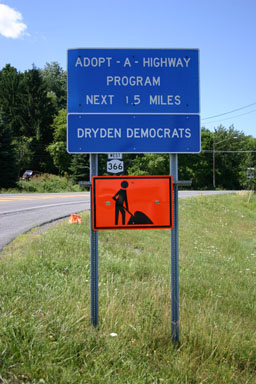
Signs of activity on Route 366.
Sticks with nails driven near the ends are useful for reaching trash, but gloves are necessary, since you can't avoid getting closer to the trash than most of us would like.
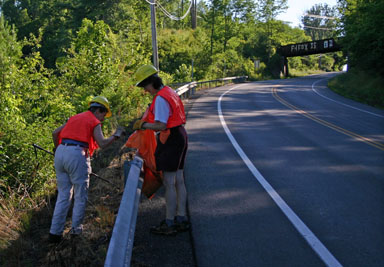
Democrats Martha Ferger and Linda Clougherty cleaning up Route 366.
Highway cleanup was pretty reasonable, and gave people a chance to talk while making a difference. Now we just need to keep it up!
July 24, 2005
Construction and planning
This week's Dryden Courier comes folded very strangely, to accomodate an "Ithaca Times Menu Guide" that I suspect was sized for the larger Ithaca Times. Inside, though, there's plenty of information.
There's an in-depth look at the summer construction at Cassavant, Freeville, and Dryden elementary schools, including information on the disruptions construction will cause at Dryden into the school year and a picture of playground equipment soon to be replaced.
There's a list of happenings at the latest Town Board meeting, including the hearing on the Comprehensive Plan. The Courier quotes Town Supervisor Steve Trumbull as saying "I think it's going to pass... There's been plenty of time for people to speak out, or give their input. I think we're on the right track.
Inside, there's an article on Southworth Library summer happenings. There's also a report on the recommendation against a county income tax, and a piece on the Group Workcamps I mentioned earlier, this time at least mentioning that it's project of church groups.
Visiting an artists' colony
I've written a few times before about the Saltonstall Foundation, the arts colony on Ellis Hollow Creek Road, but I'd never actually been there before this afternoon. They held the second of their Open Studio Sundays, showing off the work that Saltonstall Fellows have accomplished in their month of residency at the colony. They started in the main building with snacks and conversation, before moving to a tent for readings by poet Lynne Schneider and writer Laurie Stone.
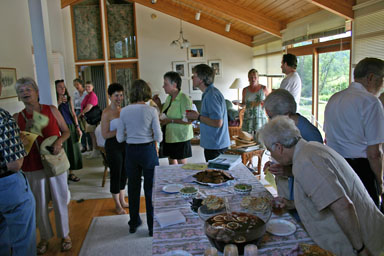
Opening the Studio with food and conversation.
After the readings, the group broke up to explore studios. The artists were in their studios to show their work and talk about what they had done and why. Joseph Hart and Sharon Moreau discussed their paintings with vistors, while photographer Laurie Stone Gina Murtagh showed off a miniature book she had created.

Exploring Sharon Moreau's studio and paintings.
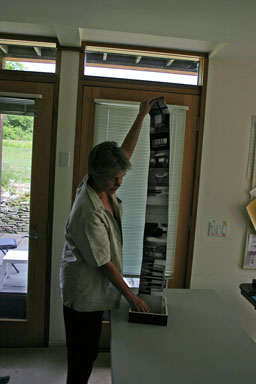
Photographer Gina Murtagh shows off a book of photos she created.
Saltonstall Fellows get to spend a month at the colony, focusing on their work while taking advantage of the facilities and the surroundings. I felt a bit intimidated taking photos of an arts colony in memory of someone who was a considerable photographer herself, but I still took enough pictures for a gallery of photos of the colony that should give you a much better feel for the place and the event.
This was the second of three Open Studio Sundays this summer. The next one will take place Sunday, August 28th, from 2:00pm to 4:00pm, following a similar format with the fellows for August. They'll also be holding literary salons with readings over the fall and winter. The colony is at 435 Ellis Hollow Creek Road (map).
July 25, 2005
114,000 gallons of water to put out barn fire
This morning's Ithaca Journal reports that a barn fire on Lake Road took seven hours and 114,000 gallons of water to extinguish. Dryden firefighters were called at 7:35, and Freeville, Etna, McLean, Slaterville, Groton, Cortlandville, Harford, and Virgil departments provided mutual aid. While the barn was lost, firefighters sprayed nearby houses and barns with water and protected them. No one was injured or killed.
On the opinion page, Jay Gallagher examines the fiscal battles between the governor and the comptroller and some of the benefits that separation of responsibility has given New York State.
July 26, 2005
Dryden Elementary recognized for performance
There's lot of Dryden news today, starting with New York State's recognizing Dryden Elementary School as a Higher Performing/Gap Closing School for its work during the 2003-4 school year.
The Cornell news for this week includes informaiton on Cornell's participation in the Fall Creek Watershed Comittee, as well as a question about public access to the Game Farm Road weather station. (There's isn't normally any, but "tours for groups, however, can be arranged by appointment by contacting Atmospheric Sciences at 255-3034."
Briefly in Tompkins notes that the State Police barracks on Route 13 has two bicycles found in the creek at Keith Lane on Saturday, and are looking for their owners. Also, TC3 won an award for educational fund-raising.
Casey Stevens tomorrow
I'll be on Casey Stevens' show on WHCU 870AM tomorrow morning at 9:00am, as Kathy Zahler, a regular guest on Casey's show, asked me to come along. When Kathy was on in June, Casey asked:
When are you going to bring [Simon] in anyway?... I mean, he really does exist?... I've seen a few emails once in a while, and I'm thinking, "who is this guy?"
I don't think my voice is exactly made for radio, but hopefully it'll be interesting.
July 27, 2005
Fire in Freeville
A four-apartment building at 12 Railroad Street in Freeville caught fire last night. Firefighters from the Dryden, Freeville, Etna, Groton, McLean and Cayuga Heights fire departments responded at 6:30pm, and had the blaze out by 7:15pm. No one was injured, but one apartment was destroyed with the others damaged.
The Dryden Central School District is using a "Solar Express Bookmobile" to encourage kids to read over the summer. The bookmobile goes out Tuesdays and Thursdays through August 11th. Tuesday mornings from 8:30am to 10:30am the bookmobile is in Edmonds Park in Harford, while from 11:30am to 1:30pm it will be in front of Little Creek Park on Lower Creek Road. On Thursdays, it will spend mornings from 8:30am to 10:30am at Hanshaw Village Ball Field off Hanshaw Road, and from 11:30am to 1:30pm it will be at Country Acres Trailer Park off McLean Road.
Briefly in Dryden includes a search by the Youth Commission for two new members, one from the Village of Dryden and one from the Town. There will be a "Mid-Sixties Classmates and Friends Get Together" next weekend for the Dryden High School Classes of 1964, 1965, and 1966, including a get-together, dinner, and barbecue. Briefly in Groton notes the "Happenin' in the Hamlet" event, which will take place in McLean at the Cassavant Elementary School Saturday, and will include softball, sack races, food, musing, a dunking booth, and fireworks, with a free pancake breakfast the next morning.
On the opinion page, Anne M. Everett writes to criticize WHCU's changing its afternoon programming to right-wing talk radio.
The Journal also reports that it sounds like Governor Pataki will be announcing that he is not running for re-election in 2006.
July 28, 2005
4-H Fair kicks off
This morning's Ithaca Journal reports on the 4-H Fair running through Saturday, to be held at 4-H Acres (map). The schedule looks packed, with animal shows, all kinds of contests, and plenty of food including a pancake breakfast and barbecue.
I stopped by the 4-H Fair this morning for the opening ceremony. Kids and adults said what they hoped to do this year, took the 4-H pledge, raised the flag, and then said the pledge to the flag.
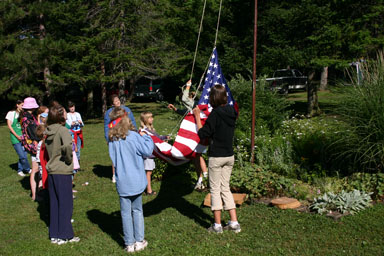
Raising the flag at the 4-H Fair.
Looks like it should be a great time.
In darker news, a Locke man accused of child pornography distribution worked as a substitute teacher in seven local school districts, including Dryden and Ithaca.
On the opinion page, the Journal's editorial congratulates Governor George Pataki for getting out while the getting's good. Pataki's done less damage than I initially expected, but less good than I'd hoped. In the last few years he seems to have spent much of his effort strengthening the powers of the governor's office as much as possible, making it all too easy for legislative leaders to justify their excessive powers over their membership as part of the brinksmanship of 3-man rule. I'm happy to see Pataki go, but I'd like to see a lot more of Albany's most powerful people depart at the same time. I suppose there's no easy way to make lobbyists depart, and gerrymandered districts make it almost as difficult for legislators to go.
July 29, 2005
Inside the 4-H Fair pole barn
Since the 4-H Fair is close by, I'm stopping there periodically to take pictures. This morning, I stopped inside the pole barn to visit the animals.
I was especially happy to see The Fair Focus, a daily paper about the fair written by 4-H participants. It gives a recap of yesterday's events along with a calendar for today. There's lots more to come today and tomorrow.
Varna Fire Company BBQ Saturday
The Varna Volunteer Fire Company will be having a chicken barbecue tomorrow, Saturday, at their station on Turkey Hill Road (map). As the sign says, chicken will be available from 11am to gone.
July 30, 2005
Yes, it's been hot
While it isn't precisely news, this morning's Ithaca Journal confirms that June and July 2005 are among the hottest ever, with the statewide average for June 5.5 degrees above normal. Looking at the list of city records there, it looks like it's definitely been the hottest summer upstate.
(I'm still trying to tough it out without installing my window air conditioners, which have stayed in storage. At first it was just because of the painters being here, but now I'm trying to through the rest of the summer. As long as nights are cool, it's not so bad, and the ceiling fan over the bed has helped when they aren't.)
There's an article on erosion mitigation on Six Mile Creek. The projects in Caroline, but as Six Mile Creek flows out of Dryden, into Caroline, and then back into Dryden before going to Ithaca, it has some Dryden interest.
In the print version of the paper, Carol Kammen reports on Patrick Campbell, who visited the area in 1792. He described the countryside between Ithaca and Owego as a "hideous place, calculated to awaken feelings of the gloomiest kind," and described the area from Ithaca to Wilkes-Barre, PA, as a "dreary region."
I don't find it particularly dreary, but I certainly wasn't here then.
July 31, 2005
Collecting fire trucks, gathering volunteers
This week's Dryden Courier leads with an article about Dave Perkins' fire truck collection, which at one point included 14 motorized trucks (now down to seven) and two buggies. There are pictures of the buggies on the cover and inside. Perkins seems to be dispersing his collection as he prepares for retirement, but hopefully some of it will stay around here.
There's also an article on Neptune Hose Company and Dryden Ambulance and their continuing need for volunteers to do a wide variety of tasks. They're happy to train people, certainly! I suspect all of the local fire companies (Varna, Etna, Freeville, McLean, Slaterville) would be happy to hear from potential volunteers, so call them up if you're interested.
There's also an article on the Solar Express, the Dryden school district's Bookmobile, emphasizing the teaching and activities that go with it.
The Village of Dryden will be holding public hearings August 18th about police mutual aid and about zoning for the 3.9 acres the village recently annexed along its northern edge.
There's also a warning about Lyme disease and deer ticks, complete with a closeup of a deer tick. They're smaller than I thought.
A notice inside announces that the Revered Alan Kinney will be replacing David Nicholls, who retired last month, as pastor at the Dryden United Methodist Church.
More upstate blogging
I refer to NYCO's Blog a fair amount, as she covers New York State issues regularly and well. Now she's created a Blog Upstate map, showing where to find people from upstate blogging about upstate. Lots of local flavor, and a wide range of opinions.
You can either click on a balloon and get a pop-up with a description of the blog and a link, or pick a title from the column on the right and it will highlight where that blog is. It's a very nice use of Google Maps, and a good way to illustrate how much interesting stuff is coming from our corner of the world.





